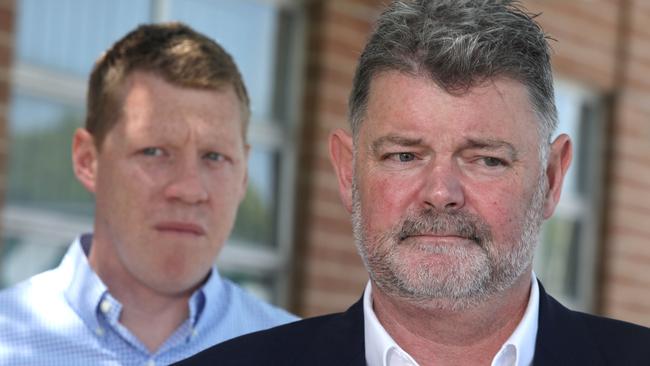Police Association of SA says officers have had their psychological records inappropriately accessed
SA’s police union president has warned officers may not be coming forward for psychological help due to confidentiality concerns.
SA News
Don't miss out on the headlines from SA News. Followed categories will be added to My News.
South Australia’s police union is “deeply concerned” by evidence that officers have had their psychological records inappropriately accessed by SAPOL – and says confidentiality concerns are preventing others from coming forward for help.
Police Association SA (PASA) president Mark Carroll told a parliamentary committee medical and psychological services should be moved away from police headquarters “at an independent location where officers can attend in relative anonymity”.
He and other emergency services unions voiced support for a bill that would change the law so that workers compensation is presumptive for first responders suffering Post Traumatic Stress Disorder because of their work.
Giving evidence on Wednesday, Mr Carroll said eight police officers had taken their lives since 2017 including two who had died in incidents at police stations that involved issued handguns.

Asked about firearm protocols, he said access was part of an officer’s job.
“If they were an operational police officer then, unless there are warning signs, they will get access per their duty to a firearm and they will go through the protocol to get the firearm,” he said.

Mr Carroll said PASA members were hesitant to access the Employee Assistance Section (EAS) because they could not be assured their records would be sealed and protected.
He said a solicitor would give evidence to the committee that “clearly indicates that EAS records have been accessed”.
Police Commissioner Grant Stevens, who gave evidence before the committee last month, said EAS files were confidential and not used for any other purpose.
“We do not have access to their files,” he said.
“I am not aware of any feedback that would indicate that there are officers who don’t have confidence in the service based on the perception that it’s not confidential.”
Mr Carroll also said SAPOL members who require an annual psychological review “sometimes slip through the cracks”.
“We believe that there are some people who don’t have their annual mandated review,” he said.
Mr Stevens is due to report back to the committee on whether officers have had their reviews over the past 10 years.
He told the committee that 790 psychological-related incidents were reported in the last 12 months – of which 92 involved injury.
Independent MLC Frank Pangallo, a member of the committee, said his bill to introduce presumptive legislation for frontline workers would reverse the onus of proof from the injured worker to the employer.
The bill is expected to pass with the support of the government and crossbench.





